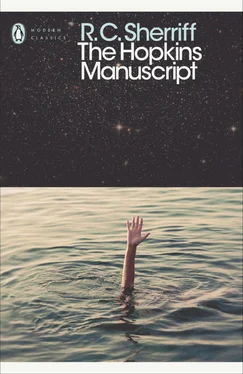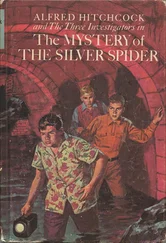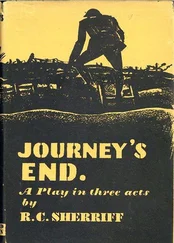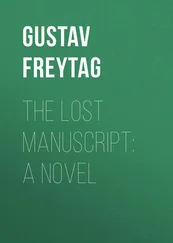Роберт Шеррифф - The Hopkins Manuscript
Здесь есть возможность читать онлайн «Роберт Шеррифф - The Hopkins Manuscript» весь текст электронной книги совершенно бесплатно (целиком полную версию без сокращений). В некоторых случаях можно слушать аудио, скачать через торрент в формате fb2 и присутствует краткое содержание. Год выпуска: 2018, ISBN: 2018, Издательство: Penguin Books, Жанр: sf_postapocalyptic, humor_satire, на английском языке. Описание произведения, (предисловие) а так же отзывы посетителей доступны на портале библиотеки ЛибКат.
- Название:The Hopkins Manuscript
- Автор:
- Издательство:Penguin Books
- Жанр:
- Год:2018
- ISBN:978-0-241-34908-3
- Рейтинг книги:4 / 5. Голосов: 1
-
Избранное:Добавить в избранное
- Отзывы:
-
Ваша оценка:
- 80
- 1
- 2
- 3
- 4
- 5
The Hopkins Manuscript: краткое содержание, описание и аннотация
Предлагаем к чтению аннотацию, описание, краткое содержание или предисловие (зависит от того, что написал сам автор книги «The Hopkins Manuscript»). Если вы не нашли необходимую информацию о книге — напишите в комментариях, мы постараемся отыскать её.
The Hopkins Manuscript — читать онлайн бесплатно полную книгу (весь текст) целиком
Ниже представлен текст книги, разбитый по страницам. Система сохранения места последней прочитанной страницы, позволяет с удобством читать онлайн бесплатно книгу «The Hopkins Manuscript», без необходимости каждый раз заново искать на чём Вы остановились. Поставьте закладку, и сможете в любой момент перейти на страницу, на которой закончили чтение.
Интервал:
Закладка:
The nights were warm, spangled with stars and sweet with the scents of boyhood. Sometimes I slept in ruined cottages or barns, but mostly beneath some derelict haystack with the field mice rustling around my ears.
It was lovely to awake in the dawn of those June mornings: to lie and watch the clouds float overhead: to know that, even if an age were dying, this countryside would remain in all its beauty though centuries might pass before man came to it again.
I avoided the towns for fear of the things that might sadden and oppress me: I passed few people on the roads and those that I met would come and go with lowered heads and a wistful smile.
Once I was startled by a cloud of dust and a horrid, discordant jangle in the distance: I hid in the undergrowth to watch a dirty, battered lorry clatter by. It was using some crude oil that made a filthy smoke and a horrid stench, and was filled with tattered, bearded soldiers. I took them to be soldiers, for they were all in freakish cartoons of khaki uniform. I imagine it was a ‘recruiting’ lorry, for there was a boy amongst them in a dirty open cricket shirt and wondering, childish eyes. I remained in hiding until it was out of sight, for although I was well past military age there was just a risk of being pounced upon and whisked away.
I spent two peaceful days with an old railway signalman who was living in his signal box upon the deserted line near Windsor. He had served this box, he told me, for nearly twenty years: twelve years before the cataclysm, when he had signalled as many as a hundred trains a day: two years after the cataclysm, when the trains began again. It was now over a year since he had signalled through the last old luggage train to Oxford. He had waited hopefully for several weeks, sitting for hours beside the little bell that would tinkle the approach of another train. But none had passed that way again.
I had developed a bad blister on my heel and the old man gladly offered me the shelter of his little home. He had a small vegetable garden and a few chickens, and we slept in the box beside the signal levers which he still kept oiled and shining.
It was pleasant to sit out in the fading sunlight of those two restful evenings, smoking our pipes and watching the old man’s chickens roam beside the rusty, silent rails. I discovered that he had shown Bantam hens in a small way before the cataclysm and was very proud of having won a second prize at Windsor! This gave us much in common to pass the hours away but I did not tell him my name lest it should embarrass him and prevent him from talking with such disarming freedom of his own little triumphs in the poultry world.
I felt quite sorry when the outskirts of London told me that my happy, carefree journey was drawing to its close. I saw more people now: ragged, dejected people whose heads seemed permanently bent forward in a ceaseless search for food. I saw a few working in the fields – a few tending their own vegetable plots and chickens, but for the most part they seemed bereft of all creative energy: they just wandered in their unending, dreary search for food.
I crossed the Thames by the old, weed-grown lock gates at Teddington and followed the northern bank of the river towards the city. The tidal waves had thrown vast quantities of silt across the boroughs of Hammersmith and Chelsea and for one whole afternoon I plodded across a plateau of flat, sunbaked mud, threading my way between the chimney stacks and church spires, guiding myself by the course of the sun.
Towards sunset upon the twelfth day of my journey I climbed the steep, narrow road to Uncle Henry’s house. My heart was pounding with excitement: the houses were in good condition here and smoke wreathed from an occasional chimney. I had met quite a few people on the last stage of my journey: some working in little gangs to clear the debris from half-buried provision shops. At every step my hopes of finding my aunt and uncle alive had risen higher.
I reached the secluded little house. It was concealed between higher buildings and it was not until I was right upon it that the familiar red brick front revealed itself.
I knew in a moment that my uncle and aunt were no longer there. The wrought-iron railings were almost buried in wild, rank weeds and I had to climb over the rust-jammed gate. I could see in a flash that my aunt’s fastidious old fingers had long since fallen from the ragged, dejected curtains of the windows.
The front door was locked and bolted: I forced my way through the undergrowth to the tradesman’s entrance and found a mildewed fragment of paper, secured by a large stone upon the doorstep.
It requested, in Aunt Rose’s bold round hand, that the milkman should leave a pint of milk ‘if possible’. I remembered the faulty catch upon the pantry window and clambered inside. I drew the dusty curtains from the morning-room windows: breakfast things for two were neatly laid upon the table in readiness for my uncle and aunt’s return from the dugouts five years ago.
I went all over the house, opening the windows to the warm, summer evening breeze. Packed snugly away between bigger, taller buildings the little house had come almost unscathed through its ordeal.
I opened the French windows of the upstairs drawing-room, drew a chair onto the verandah and sat down to think.
It was better, after all, that my Uncle Henry and Aunt Rose were no longer there. It would have been very hard to have two old and failing people upon my hands, for by the look of things I should have my work cut out to keep myself alive.
From the balcony I could see a long stretch of the Bayswater Road, with the shadows of the Park beside it. Why had I left my house in Beadle Valley? Loneliness had driven me to leave, yet in this ruined city I seemed lonelier than ever.
But at least I had the advantage of new surroundings here. Even the labour of living might offer a new and diverting occupation. Desperate and derelict though the great city seemed, I might find little communities hidden away – even some remnant of social life to pass the hours.
Twilight came: an old man drove two cows across the road from Kensington Park and through the open doors of a bank. He closed them in for the night and went away. Two people came from the Park with bundles of wood and pails of water, and then it was too dark to see any more.
I groped for one of the spare candles in my haversack. I lit it and explored the house. There was some tinned food in the larder including condensed milk and coffee: there was still some wine left in the cellar. I cleared one place away from the breakfast table and ate a substantial meal. I took a book from Uncle Henry’s library and read for a little in a silence broken only by the distant baying of dogs – and then I went to bed in the room that was always reserved for me in days gone by.
I have no power to record my day-by-day existence through these final days. My hopes of finding a remnant of organised social life faded with my first day of exploration, and by force of necessity I fell into the strange routine of those around me. There were, at that time, perhaps five thousand people in London – scattered over its length and breadth – but only a few in each district. They lived a scattered life because it was easier that way. Food was the one absorbing factor of existence and although sufficient could still be found in ruined shops there was only enough so long as we lived well separated from one another and gained by mutual consent our own individual hunting grounds.
I found a little district that seemed to belong to no one: a row of small shops hidden away behind the Camden Road. One was a fried-fish shop, and amongst the debris I discovered some tins of oil and fat that served for my lamp and occasional cooking. A little grocery store adjoining had completely collapsed. I spent a week in clearing away the wreckage and my labour was well rewarded in sardines and tinned spaghetti. This little hunting ground served me without fail for the best part of six months and it was not until the winter that I had to search farther afield, with gradually diminishing success. Sometimes I met with little families hunting together, but mostly they were people like myself, hunting quite alone.
Читать дальшеИнтервал:
Закладка:
Похожие книги на «The Hopkins Manuscript»
Представляем Вашему вниманию похожие книги на «The Hopkins Manuscript» списком для выбора. Мы отобрали схожую по названию и смыслу литературу в надежде предоставить читателям больше вариантов отыскать новые, интересные, ещё непрочитанные произведения.
Обсуждение, отзывы о книге «The Hopkins Manuscript» и просто собственные мнения читателей. Оставьте ваши комментарии, напишите, что Вы думаете о произведении, его смысле или главных героях. Укажите что конкретно понравилось, а что нет, и почему Вы так считаете.












